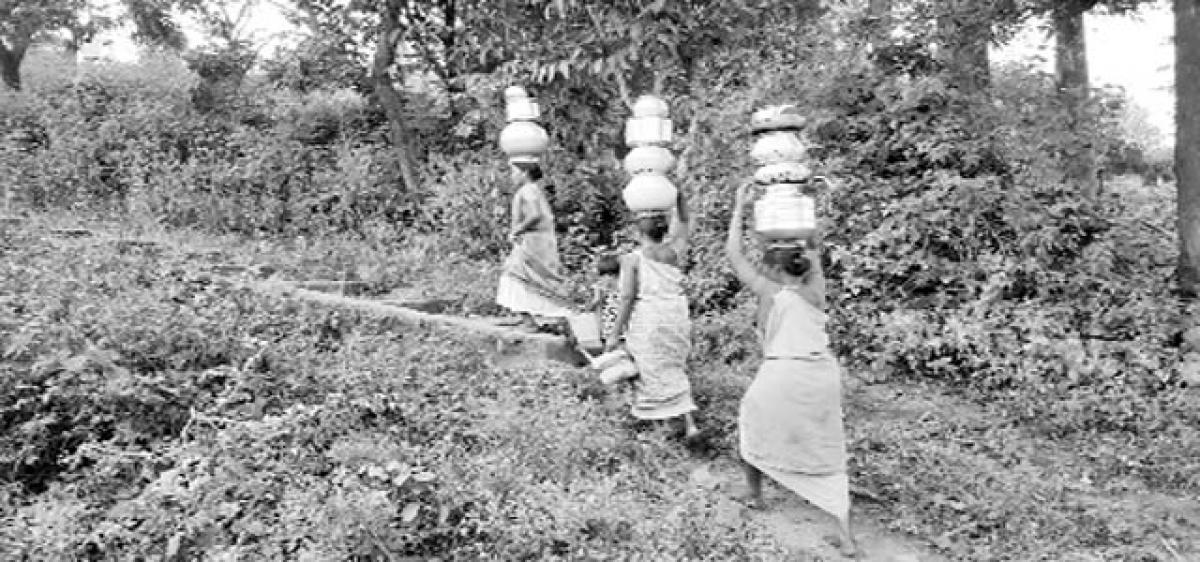Live
- Violence mars polls in Manipur
- Israeli missile hits Iran
- Women voters become a deciding factor in Nellore
- Congress eyes opening of account in Prakasam
- World’s highest polling station in HP has 52 voters
- Zero voter turnout in 6 Nagaland dists
- PM takes ‘atta’ dig at Pakistan
- Cong outdated: Rajnath
- Anantapur: Give no more chances to Jagan says Chandrababu Naidu
- Congress strategy to outwit BJP in North Telangana
Just In

The recent Supreme Court judgement permitting banks to sell mortgaged property of tribals to non-tribals, which is prohibited by State Legislations, will impact the livelihoods of millions of tribals in the country.
The recent Supreme Court judgement permitting banks to sell mortgaged property of tribals to non-tribals, which is prohibited by State Legislations, will impact the livelihoods of millions of tribals in the country.
The Court held that the Securitisation and Reconstruction of Financial Assets and Enforcement of Security Interest Act, 2002, a Parliament enacted legislation, will have overriding effect over the Tripura Land Revenue and Land Reforms Act, 1960, which restricts sale of mortgaged properties by the banks to non-tribal.
Because, there is no such embargo in the Security Interest Act, 2002, on the sale of mortgaged property by banks to non-tribals in realisation of debts. The Supreme Court held that inclusion of the Tripura Land Act 1960 in the IX Schedule of the Constitution by itself would not confer any immunity to it from being overridden by the Parliament enactment.
The matter came up before the Supreme Court after it was approached auction purchasers who are non-tribals, following a judgement of the Agarthala bench of Gauhati High Court in favor of tribals who challenged the sale notification issued by UCO bank in contravention of the protections encapsulated in Tripura Land Act 1960,which has an embargo on the sale of mortgaged properties of tribals by bank to non-tribal.
However, the Supreme Court judgement in UCO Bank Vs Dipak Debbarma has nothing to do with the laws emanating from the Constitution of India. The SC held that the law enacted by the Parliament is a dominant legislation and would have overriding effect over the State legislation.
But does not mean it will prevail over constitutional law? Is this judgement irrelevant to the existing the constitutional laws prevailing in the Scheduled Areas of Andhra Pradesh and Telangana in relation to tribal land protections, which prohibit even banks to alienate the mortgaged property by either tribal or non tribal to other non-tribals.
The Land Transfer Regulations 1 of 70 prohibits transfer of lands not only between the tribals and non-tribals but also among the non-tribals in the Scheduled Areas of both Telangana and Andhra Pradesh. The Supreme Court declared the AP Scheduled Area Land Transfer Regulations 1 of 70 (LTR) are constitutionally valid in P Ramireddy Vs State of AP (1988).
These regulations are an emanation of Para 5(2) of the Fifth Schedule to the Constitution itself; as such these Regulations will have overriding effect over any other state or central laws. These Regulations say that “No immovable property situated in the Agency tracts and owned by a member of a Scheduled Tribe shall be able to be attached and sold in execution of a money decree against such member, except to the extent and the manner prescribed.
The Governor notified Rules in 1969 under the LTR Regulations debar the District Collector to give a consent of sale of immovable property to a non-tribal in execution of a money decree against the member of ST. Even the decrees passed by the courts situated in the plain area should be executed only through the District Collector if the decreed land is situated in the Schedule V Areas.”
Further the Supreme Court of India held that transfer of land by State or juristic person corporate sole etc., stands prohibited to achieve the object of para 5(2) of the Fifth Schedule of the Constitution and Sec.3 of AP Scheduled Area Land Transfer Regulations in Samatha vs. State of Andhra Pradesh (1997). Therefore the constitutional law is very clear in protection of tribal lands in the Schedule V Areas of Telugu States.
The SC judgment which is in the current debate does not have any bearing on the tribal land protections laws in force in the Scheduled V Areas of AP and Telangana states. However, it would have a far reaching implication on the livelihoods of tribals in other states having Scheduled V Areas.
The judgement will pave a way for non-tribals to infiltrate to the Scheduled Areas of other States in the country and intensify their business activity to grab the resources. Unlike in Andhra Pradesh, no such legislation has been in force in any other part of the States having Scheduled Areas banning the land transfer in favor of non-tribals.
That is the reason the State itself is handing over the natural resources to private mining companies to do mining or exploitive activities in the Scheduled Areas of other States. This judgement of Supreme Court will help the non tribal companies or non-tribal individuals to gain access to lands of indebted tribals to banks.
Infact the State has been responsible for the impoverishment of tribes and now the Supreme Court Judgement is negating the very right of tribes over their hinterland to retain with them. Therefore, the Governors of the States having Scheduled Areas have to bring Regulations under Fifth Schedule of the Constitution on the lines of LTR in Andhra Prades, banning the land transfers in favour of members other than the Scheduled Tribes or societies or companies solely composed with the members of Scheduled Tribes.
By Dr Palla Trinadha Rao

© 2024 Hyderabad Media House Limited/The Hans India. All rights reserved. Powered by hocalwire.com







